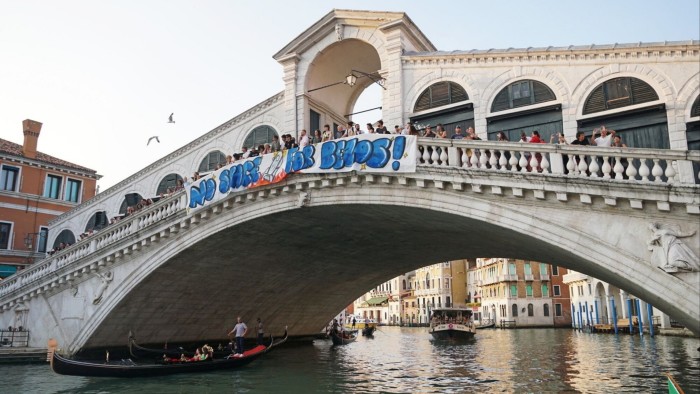Unlock the Editor’s Digest for free
Roula Khalaf, Editor of the FT, selects her favourite stories in this weekly newsletter.
The writer is author of ‘Daughter of the Sun’
When the water reached 150cm, I started texting my friends. Are you OK? What’s happening?
It was winter 2019 and Venice was flooding in a way most of us had never seen before. At its peak, the water lapped 187cm; two people died and €1bn of damage was done.
Venetians knew it was a tipping point. The rising tides were so exacerbated by global warming that the city was irredeemably at risk. If such floods were to become commonplace, it would no longer be safe to live there.
In 2020, Venice’s flood barrier, MOSE (partly named after Moses) finally became operational. It has mitigated the worst of the high water. But environmentalists allege that it is unsustainable — doing long-term damage to the already fragile lagoon.
In a nutshell, Venice is still in peril and needs all the help it can get. Surely then, Venetians should be rejoicing at the news that Jeff Bezos has donated €3mn to three local organisations dedicated to giving Venice a more sustainable future.
But in the city of romance, money can’t buy love. Bezos has been greeted with angry protests by locals who say he is treating Venice as a private playground by choosing to marry his fiancée Lauren Sanchez there in a multi-million-dollar extravaganza this weekend.
Greenpeace unfurled a banner in St Mark’s Square saying, “If You Can Rent Venice for Your Wedding You Can Pay More Tax”. Local activists, including affordable housing advocates, calling themselves No Space for Bezos protested on Rialto Bridge and threatened to fill the canals with inflatable crocodiles. On Saturday, there are plans to disrupt the wedding with a citywide march.
The fury directed at the Amazon founder and his entourage reveals a community clear-eyed about the destruction wrought upon it by greed. The excesses of the tourist economy are reducing Venice’s precious anima — its soul — to a hollow, Disneyfied shell. Houses are affordable only by the very wealthy, non-tourism jobs are all but non-existent and public spaces constantly battle against closure.
Bezos is especially unwelcome in Venice because of Amazon’s model of online commerce, which has gutted towns across the world of small businesses. The struggle to preserve the city’s independent enterprises is ferocious and quotidian. Locals still grieve for the demise of beloved emporiums including ironmongers and bookshops.
When I first moved to the city in 2002, proud of my newly acquired Italian, I went to buy apples at my nearest grocer. The elderly lady at the till looked at me blankly. “I don’t speak Italian” she said. “Just dialect.”
How can the super-wealthy empathise with this granular, local pulse? The three-generation families out in their boats, granny, pushchair and all; the vaporetto pilots greeting each other as old friends; the children playing football in the squares.
To the international elite, Venice is a backdrop, a setting for glamorous nuptials much like a Vegas hotel. But to those that live there, Venice is home. With less than 50,000 inhabitants these days, it’s pretty much a village; startlingly beautiful but woven through with gossip, feuds and broken hearts. It’s the fishmonger your grandmother told you to always use; the reliable electrician you pray doesn’t move to the mainland; rowing at dawn when the canals are as motionless as glass.
Now, in true David and Goliath style, a few thousand Venetians are prevailing against a magnate whose net worth is $233bn. The wedding’s location has been switched to a more secluded venue for fear of further protests. Apparently the threat of inflatable crocs was the last straw — images of the festivities being blocked by toy reptiles would have gone viral before vows were exchanged.
Donations alone won’t fix this fragile city; if Bezos really cared about Venice, he should, as a Venetian cleric recently opined, have got married in Beverly Hills.
